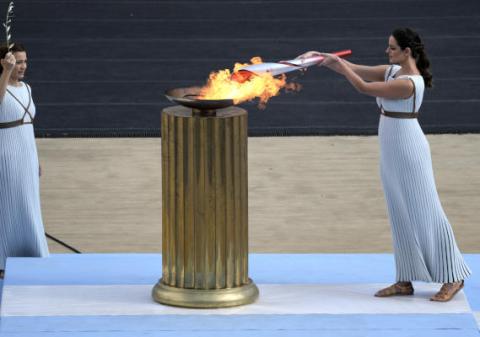
On Sunday night, during the Paralympic handover ceremony, Tony Estanguet could be seen bounding on to a stage in Paris in a black polo shirt and stonewash jeans. Full of energy and boasting a big smile, like a radio DJ or Club 18-30 rep, he geed up a maskless crowd to get ready for the biggest experience of their lives: the Games were coming to France.
Estanguet is the president of the Paris 2024 organising committee; his enthusiasm is understandable and the crowd around him a deliberate choice. At this point in the cycle possibility is limitless. It is when the next Olympic and Paralympic host can conceive of itself as the ultimate expression of those original values of ‘excellence, friendship and respect’. Reality begins to intrude later.
A former C1 slalom canoeist, Estanguet is the only French athlete to have won a gold medal at three Olympic Games. He is 43 but looks younger, which is probably helpful given the amount of stress he is about to endure. His job in the next two years is to create two sets of games – one that has to deal with Covid, one that does not – but he has other issues to contend with too, the first of which is legacy.
Estanguet has spent a lot of time studying London 2012 and he came to the conclusion Paris would do things differently, that the ambition to ‘inspire a generation’ into greater physical activity in the UK had not worked. “We have had many many meetings with London executives,” he says. “I met with Seb Coe several times over the last years and we met in Tokyo this summer.
“It’s not because you organise the games that there is an impact in the country. I think the difference is we have started earlier with [the legacy] programme. We have invested more means and more resources in this objective.”
Paris 2024 has two initiatives underway that seek to engage with the general public. The first is a school-based programme, with an Olympic and Paralympic week taking place once a year. Estanguet says 1m schoolchildren have been reached by this programme. Then there is the Terre de Jeux, a devolved, community-based programme.
Communities have access to resources and activities such as the current ‘Ping tour’, which is show-casing the elite table tennis programme around the country. But one thing they do not get is funding as the 2024 Games are to be paid for almost entirely by private sponsors.
“For the first time it’s not just the cities where competitions will be held that can be part of the [Olympic and] Paralympic Games, it’s all the cities in France,” Estanguet says. “We started two years ago [and] we already have more than 2,000 cities with this label ‘Terre de Jeux’.”
Public engagement is the animating vision, hence the crowds in Paris on handover day. The slogan for their successful bid was “Paris 2024: made for sharing”. The logo for the Games, which has not been immune to internet mockery, tries to capture this idea by being a version of the Olympic flame and the face of a young woman with a short bob haircut.
Among the ideas developed to help aid engagement, Estanguet plans to make Paris 2024 the first Games to have a common standard that ensures accessibility to venues and events for people with disabilities. He also has two key ideas for the competition. The first is to take the opening ceremonies out of the Stade de France, the major venue, and on to the streets. The second is to open up some of the events so that, while participation is not directly shared between international athletes and the public, it comes close.
“The idea is to move to the people,” Estanguet says. “We will transform the city of Paris into a big Olympic and Paralympic park. We don’t want them to come to the stadium, we want to transform their city into a sporting atmosphere. We have the idea of the marathon open to the participation of the public. On the same day on the same road it will be open to thousands of people. The athletes will start at 9 and the public at 10. We will also do the same for the road cycling event.”
Moving the opening ceremony out of the stadium will “change the scale, having potentially hundreds of thousands of people participating in this symbolic moment”.
That is presuming people can attend Games. Estanguet says Paris has undertaken a review that has found €350m (£300m) of savings from a budget of €3.9bn to create a Covid contingency fund. But even tougher decisions may have to be made.
“In our timeline we open ticket sales in the middle of 2023,” Estanguet says. “I don’t feel comfortable with announcing a ticketing programme and then [rolling] back afterwards. We will look at the situation again at the end of 2022. If we are still in the same uncertainty, then we will have to start to find different options.”
Tokyo has shown it is possible to stage the Games in a pandemic, though that is not necessarily a lesson anyone wanted to learn. “Merci, thank you to Tokyo 2020 to have been able to adapt, to find solutions, even if it’s not ideal,” Estanguet says. “We were able to watch the Games, we allowed the athletes to realise their dreams and, with that, put Covid a little bit to the side for a few weeks.
“Tokyo has been good learning for us in case we have to do the same. But I really hope it won’t have to be the case.”












